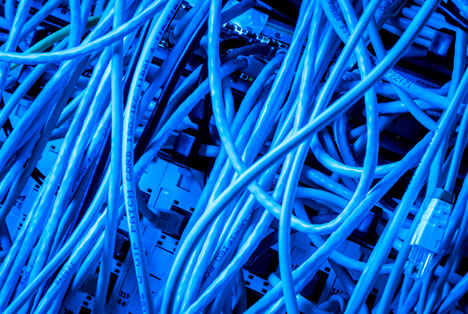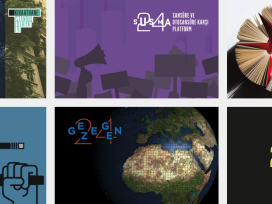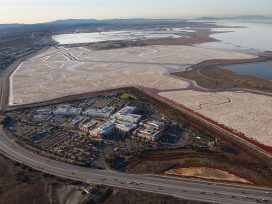For anyone living in a democracy, some form of freedom of speech and association are essential. In pursuit of common interests, whether those are cultural creation, political protest or neighbourhood sharing, people meet and organize, broadcasting their views internally to fellow members and externally to fellow citizens.
The mechanics of speech and association change as people make use of new technologies. People corresponded via mail, pamphlet, telegraph, newspaper, and magazine in the nineteenth century, adding telephone, radio and television in the twentieth century.

Network infrastructure with cables connected to data centre. Photo: kubais. Source:Shutterstock
In the twenty-first century, a growing portion of individual speech and associational life occurs online. Using the Internet and social networks, we speak and associate with greater ease than ever before. What is blogging or Twitter if not the modern pamphlet or telegraph? What is Facebook and LinkedIn if not the modern community association or chamber of commerce?
To safeguard freedom of speech and association, democracies have built a set of laws, norms, and institutions. These norms, laws, and institutions must of necessity adapt with the forward march of technological innovation.
Which leads to a fundamental question: what adaptations do we need as freedom of speech and association moves increasingly from the offline to the online world? What policies and assumptions concerning free speech and association should, or even could, transfer from our real world practices to the digital world?
One simple thought is that the infrastructure of free speech and association in the offline world transfers, or has already transferred, cleanly to the online world. This is false.
In the digital world, speech and associational life is different in at least four ways.
First, basic connectivity and access to services provided on the Internet are typically mediated by businesses, much more so than access to physical associational spaces ever was. In order to get online – and to participate in the digital commons – most people must agree to the terms of service set by commercial businesses, which typically aim to monetize the data they collect on users. Moreover, many governments also heavily monitor and mediate access to these digital spaces for their citizens, limiting what they can see and say online.
Second, online and mobile device associational activity – texting, game-playing, social networking – involves our digital “persons” as much as our “analogue” selves. Our presence and full catalogue of activity in the digital sphere is visible to the companies and governments that provide the infrastructure in ways that aren’t possible, or are legally prohibited, in the actual world. How does online anonymity change how we feel about online speech and associational life, and what do we make of so-called “real name” policies that seek to eliminate that anonymity?
Third, our digital interactions spin off a secondary set of data unlike anything possible in the physical world. This combined “data exhaust” of clicks and calls, search terms and consumer purchases, create a repository of information that is perhaps most valuable in its aggregate form. Companies use it to sell space to advertisers and improve their services; governments use it to track relationships among terrorists and criminals, or more worrisomely, among political dissidents, whistleblowers and social critics. Yet these aggregations of big data can also be used for public benefit, such as predicting disease outbreaks, finding unanticipated relationships between medications and side effects, or even as raw material for new kinds of social science.
Fourth, as new kinds of data emerge, so do new privacy concerns. In the past, metadata such as phone logs or television ratings did not reveal much information on their own, or the private information they could reveal was prohibitively expensive to uncover, so privacy protection was not considered a pressing issue. In an era in which complex social network analysis has become trivially easy, however, we are forced to consider anew rules and norms of privacy. How can we protect personal privacy, allow contributions to and the creation of new shared social resources, while at the same time maintaining a shared associational space free from corporate or government overreach?
We might look to the philanthropic world, for instance, where issues of donor control and anonymity are central to the operating structures of charitable giving and the creation of private foundations. We now face similar questions about donating private data assets to organizations working for the public benefit. The global success of the Creative Commons movement shows that people do not hold a uniform view about how or to what extent their data should be preserved exclusively for private use. When given the choice, many of us give a lot away. How enterprises navigate the tensions of private data and public good will become a differentiating factor for organizations in the social economy; not all will make the same choices.
We live in age where the creation, distribution and ownership of material online, and the social connections between people online have caused a revolution in private goods in the world of commerce. In the space of 15 years, we have seen upheaval in many industries, most notably in music, books, newspapers, movies and television. What is less heralded, but no less revolutionary, is what the digital world is doing to policies and practices of free speech and association. We need to confront the differences between offline and online speech and association. And, in the light of the differences, we need an informed public debate about rules to govern the online world.
Efforts such as FreeSpeechDebate help to illuminate the differences not only across countries and cultures in attitudes about speech and association, but demonstrate differences in offline and online behaviour. It’s important we ask the right questions, even if the answers are not yet clear.
I see two answers beginning to emerge.
First, the capacity to speak and associate online – basic connectivity – should be seen not as a service available to consumers in the marketplace but as something approaching a civic entitlement. This does not mean that connectivity need be provided by the government any more than are utilities such as phone service, water, or electricity. These latter are frequently privately provided but with guarantees of service to people who cannot afford them. The implication is that connectivity should come to be seen as an essential element of public infrastructure. Connectivity becomes a public good, non-excludable like a well-lit harbour, available to everyone if it is available to anyone, and non-rivalrous like clean air, with no diminished supply when consumed by any one person.
How close are we to such an attitude toward connectivity? In summer of 2013, no less than Mark Zuckerberg declared, his business interests notwithstanding, that connectivity is a basic human right.
Second, the thornier issues of privacy remain unsettled, and the difference in attitudes between offline and online activity is stark. Consider mail service, for instance. Mail delivery via national postal systems is “network neutral”, a promise to deliver any package or letter, regardless of content, and typically protects privacy, opening another person’s mail is a crime. But in the online transmission of messages, we struggle over network neutrality and there are no guarantees of privacy. And here it is not only the commercial interests that fail to guarantee privacy – where, for instance, Google scans email or Facebook scans posts to deliver users targeted ads – but also national governments, which store virtually every trace of digital activity.
In this domain, we see a clear movement away from the privacy protections that were commonplace in the offline world. The balance between civil liberties and security that had been struck in the offline world is shifting decidedly toward security in the online world. That is a fact. Whether it reflects well on democracy’s emphasis on free speech and association is the question we need to ask ourselves.







